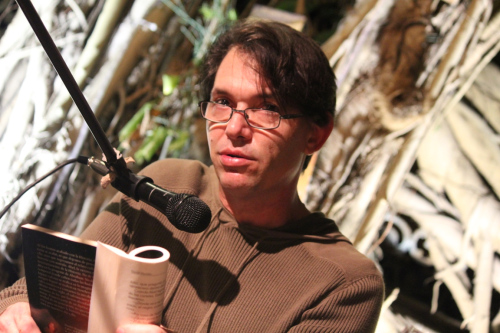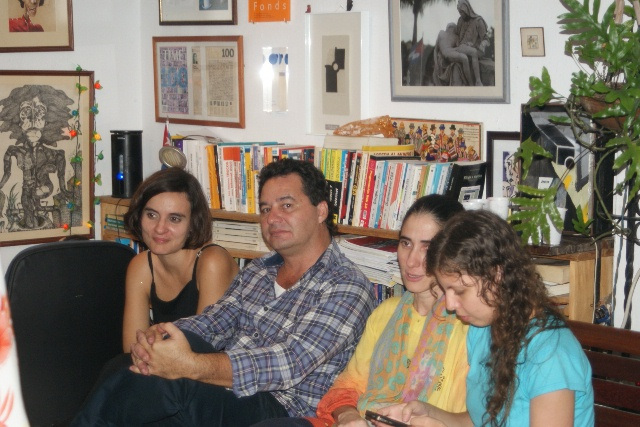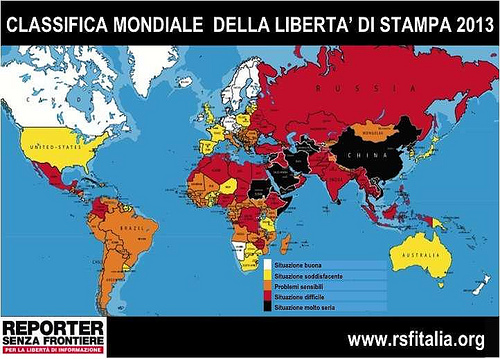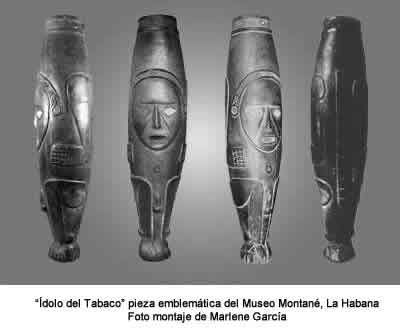It is only eight years until 2020, and while I personally do not like to make predictions, this is an essay, so I will pretend to have 20/20 foresight in order to prognosticate and sketch out the socio-political and economic outlines of Cuba at that time.
In 2020 Cuban society will perhaps have broken through some of the cellophane constraining people’s rights, but will still not enjoy all of the fundamental freedoms essential for human dignity and the common good. Eight years is not very long to repair this canvas faded by the inclement weather of neglect and blurred by the helplessness brought on by injustice. continue reading
For more than five decades, the Cuban regime has been coming up with weak arguments for the long list of prohibitions, violations of human rights and the unjust laws which it has imposed on society. These pretexts, while publicly supported by a segment of our fellow citizens who have felt obliged to feign approval in order to fit in and survive, have been indefensible for some time.
Thanks to Missile Crisis of the early 1960s, generated largely by the governments of Cuba and the Soviet Union (USSR), the Revolution’s then young leadership benefitted from an agreement between the United States and the USSR in which the former agreed not to attack Cuba.
During this entire time successive American administrations have abided by and respected this agreement in spite of the hostile rhetoric coming from one or more of them. The effect has been to untie the hands of Cuba’s longtime leaders, leaving them free to intervene in the world’s many conflicts while demanding the opposite of society and its political/military structure.
This demagogic game relies on a convenient enemy always ready to attack us — the wolf from Aesop’s fable — which has provided them with a permanent hold on power unprecedented throughout the world and in the Caribbean archipelago.
Dictatorial bosses are resisting change because they do not want to lose “their non-aristocrat’s aristocratic privileges.” This basically becomes an imperative for them since they lack alternatives and risk losing their jobs. Because the results of their governance have been so disastrous, they also want to exonerate their families of responsibility by placing them in ever more important and lucrative positions, which will give them widespread and visible recognition.
But since this is not a history lesson but rather a prediction about the future in the very short span of eight years, I will begin by giving some clues as to what I believe our country will look like in 2020.
It is very likely that by then the architects of the Cuban model will no longer be around. Because of political and ideological inertia, personnel changes and vested interests, however, their influence may live on in the positions traditionally held by their loyal and well-established cohorts, friends and family members.
The possible composition of this “Cuban landscape” will be subject to certain variables, such the presence, or lack thereof, of some of the ultra-conservative historical personalities who share responsibility for creating this system, a reconciliation with the Cuban diaspora, and the normalization of relations with the United States.
For a very long time the Cuban government has maintained the ruse that US policy towards our country corrals them, forcing them to impose draconian laws which violate people’s fundamental rights and deplete our resources. This “historical portrait” omits mention of the property that was expropriated from Cuban citizens and American companies, as well as the people on whose property rights they trampled and which today are being reaffirmed because of the economic disaster that has destroyed Cuba.
Additionally, the flood of influences, cloaked in the mask of solidarity, overwhelmed the economic capacity of this small country. Everything they exchanged for international support to justify their violations of human rights and lack of civil and political freedoms burdened us with debt and led to financial ruin.
We know that the traditional policy of Cuban authorities has fundamentally imbued American administrations with the colors and textures of blame for the disasters which have befallen our homeland. Their ethical reasoning has exposed the aesthetic of eluding responsibility, of taking the easy way out, by pointing their brush at the neighbor with the largest palette beyond our northern shores.
But what have Cuban authorities done to encourage an improvement in relations with the nearby giant? Many of the conditions which gave rise to the disagreements between both states still endure and are maintained willingly by the two parties. The same self-portrait endures, with Cuba’s steadfast refusal to join the chorus of the world’s other democratic countries.
They relapse by supporting those states which have marked differences with the United States, and subsist on the dilated “pointillism” of time. Their hostile rhetoric makes any understanding or possibility of dialog between the two governments impossible.
Similarly, the authorities maintain an antagonism with the Cuban diaspora – principally those in the United States. Why are they concerned about defending the human rights of other countries’ citizens while they violate the rights of their own? It is not ethical to try to normalize relations with our neighbor if we are not capable of fixing the problems we have within our own national home. Any process leading to the normalization of relations must begin with the reconciliation of all the children of our common home.
Most importantly, it is with our emigres that Cuban totalitarianism must reconcile since it is they who have suffered the most from injustices committed in the past and whose rights have been violated in a sustained way for more than fifty Januaries.
They are also the nationals who will have to be first called upon to invest on our native soil. Why have Cuban authorities looked to foreign investment, now principally American capital, to solve their economic problems? What about the financial wealth of our compatriots living in other latitudes? In eight years time we must resolve the issue of participation by Cubans living overseas in the economic development of Cuba, who are linked to those of us living on the island. Though we have been decapitalized for more than half a century, we still possess cognitive abilities.
By 2020 we should see more freedoms and the reform of unjust laws imposed by the dictatorial Cuban regime. The foundations and “highlights” are in the past and the present, in everything that we, as Cuba’s alternative civil society, have proposed and whose initiatives, adjusted to suit their interests, the authorities are currently adopting.
Their success depends on the will of Cuba’s leaders to “draft” what is necessary to obtain an increasingly harmonious cohabitation with Cuban natives, economic expansion and participation on the part of Cuban nationals living overseas, who could serve as the most effective mediators or negotiators in the process of normalizing relations with the United States.
In eight years Cuban leaders should have already have “sketched out” an irreversible transition towards recognition of rights such as respect for the property rights of its citizens, which has been one of the sore points of the Cuban situation. The long-delayed redrafting of a new, pluralistic Constitution is essential for any desired democratic outcome, and must form a part of future leaders’ political “outline.”
Perhaps in 2020 our streets will still have potholes, but we will be working towards changing or eliminating obstacles to the main objective, which should be the prevailing goal for our children — national reconciliation and rebuilding the country.
The best “portrait” we Cubans could give ourselves would be for those who hold power in have Cuba to ratify the United Nations’ Convention on Civil, Political and Economic Rights as the first “brushstroke” in beginning to regain our civil liberties.
If the rulers take necessary steps urgent for our society, which by that time will be legalized political alternatives, we will be able to freely express ourselves and freely associate according to our pigments or ideological colors. For now, I prefer to imagine that we will have the power to draw a mural without splintering for lack of freedoms and rights; in which we will paint ourselves as a perfectible society that will continue indefinitely seeking the most just paths for all the members of our nation.
January 31 2013
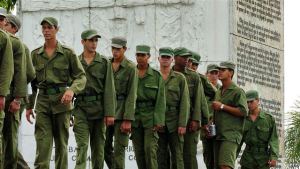 The old Communist dogmas dictated that certain behaviors were seen as socially immoral actions. There are several testimonies of people interned in concentration camps were they tried to reeducate the so-called “Dispersed Sexual Addresses.” Loving someone of the same sex was a criminal act that entailed consequences and established punishments.
The old Communist dogmas dictated that certain behaviors were seen as socially immoral actions. There are several testimonies of people interned in concentration camps were they tried to reeducate the so-called “Dispersed Sexual Addresses.” Loving someone of the same sex was a criminal act that entailed consequences and established punishments.





